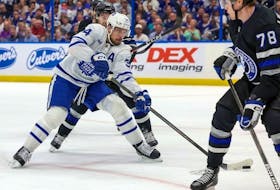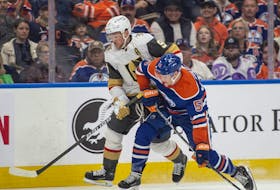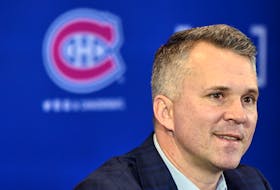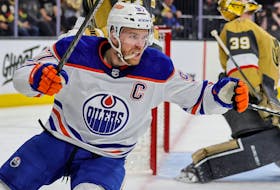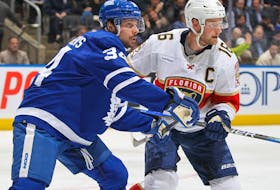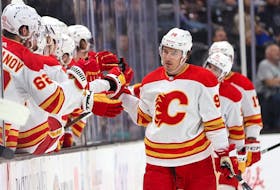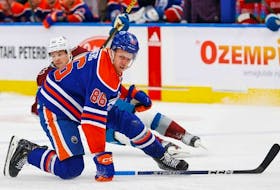
In 1997-98, Nilan took over an expansion team in the East Coast Hockey League, the Chesapeake Icebreakers, and led them to a 34-28-8 record, winning the John Brophy Award as the league’s coach of the year.
Today, Nilan is a player again, this time within the media, doing the noon-3 p.m. slot, five days a week, on Montreal’s TSN 690.
Yet despite everything the Boston Tangler has accomplished, Nilan is still “Knuckles”, the fifth-most penalized player in NHL history, who still has his little corner within the league’s Official Guide and Record Book as the only player to accumulate 10 penalties in one game (six minors, two fighting majors, 10-minute misconduct and game misconduct).
So it’s no wonder Nilan’s memoir, which will be released next week as he tours Newfoundland with some of the Canadiens’ alumni, has been aptly named “Fighting Back: The Chris Nilan Story”.
Of course, the recount of Nilan’s life might well be “Second Chances”, or “Against the Odds”.
He grew up on the hardscrabble streets of West Roxbury, Mass., in the shadows of Beantown. In Nilan’s world, if you acted like a lamb, you got eaten. So he walked around with his head up and chest out while carrying a chip the size of the Garden on his shoulder.
In 1978, the Canadiens saw something in the spunky forward out of Boston’s Northeastern University, and selected him in the 19th round of the 1978 Entry Draft. Two hundred and thirty-four players were selected that year; Nilan went 231st.
Nilan’s life might well be seen as one big fight: a fight to climb out of West Rox to get to college, a fight to get noticed by an NHL team, a fight to command respect in the minors, a fight to land full-time NHL employment and, of course, perhaps his most formidable opponent, a fight to regain sobriety.
Nilan is 55 now, and sometimes it hurts to breathe. All told, there have been some 30 surgeries — not all during his playing days — on his knees, ankles, shoulders and hands.
He’s been to hell and back, having battled addiction to booze and drugs.
And while some may chalk it up to another former NHL fighter struggling to eke out another day, Nilan says that’s not the case.
And don’t dare suggest that he may have some lingering regrets of a career that saw him rack up 3,043 penalty minutes over 13 seasons and 688 games, other than the time he busted Boston’s Rick Middleton in the chops (picture Mike Tyson beating up Richie Cunningham).
“I loved fighting so I didn’t have a problem doing my job. Honestly,” Nilan said after his show this week. “There were some difficult nights — physically and mentally — no question, but you have to deal with stuff in life.
Felt fear, wasn’t scared
“Sure I had fear. C’mon. But I can say I was never scared because when your scared, you freeze. With fear, you either run or you stand and fight.
“And I liked doing that job. Some guys say they hated it. Georges Laracque said he hated doing that job, said he doesn’t know too many guys who like it. I loved my job, loved the fighting. Was it difficult? No question, but I did not have a problem doing that. I thrived on that.”
Nilan was a scrapper and hard-nosed player in college, but it wasn’t until he turned pro that the gloves start dropping with frequency.
As a rookie with the American league’s Nova Scotia Voyageurs, Nilan totalled 304 PIMS in only 49 games. Montreal called him up from Halifax for a 15-game audition (he piled up 50 minutes in penalties), and the following season, he was an NHLer for good.
“I always worked hard, and I always wanted to be a hockey player,” he said. “I had decent skill ... not great skill, but decent skill, and I didn’t go in thinking I was going to be a fighter. I went in to be a hockey player. But, you know, a college kid, playing the pro game, playing the pro game in Canada, it’s like, ‘Who’s this college kid up here playing physical and trying to be a tough guy?’
“I was just playing the type of hockey I grew up watching with the Bruins. They played physical, they played tough. So I got challenged a lot, (getting called) that pussy college kid. And even though I had 304 penalty minutes in 49 games, I had 15 goals and 10 assists. A point every two games for a tough guy, you know, is pretty good.”
And so, as the Canadiens were retooling themselves in the ’80s from the juggernaut of the 1970s, Nilan routinely totalled 200-plus penalty minutes — he had 300 or more twice — and enjoyed three straight seasons of 16, 21 and 19 goals.
“Fighting was the easy part,” he says. “Becoming a full-time NHL player, one who didn’t sit at the end of the bench the whole game, was probably the most difficult thing, and I achieved that.
“I don’t think I could have ever done the job I did playing two minutes a night. I played in an organization that honestly wanted me to be more than a fighter. They wanted me to be a hockey player and they worked with me to do that.”
see ‘DIDN’T FEEL’, page B3
Nilan was out of hockey for a number of years following his playing days, until Lemaire put out the call to join him on the coaching staff in Jersey.
That stint lasted only a year, and after a one-season hiatus from the game, was hired to run the Icebreakers, where his player/assistant coach was Derek Clancey of St. John’s.
After taking home coach of the year honours his first season in Chesapeake Bay, Nilan got a call from Pat Burns, coach of the Boston Bruins.
Burns had been pushing for Nilan to take over the Bruins’ AHL team in Providence. Burns called to say Boston general manager Mike O’Connell would be calling that night.
“He called all right,” Nilan laughs, “called to tell me (Peter) Laviolette got the job.”
Nilan returned to the Icebreakers for another year in the Coast, and Laviolette won a Calder Cup in Providence.
It was during that second season in Chesapeake, and certainly after the team left for Jackson, Miss., after two seasons, that things started falling off the rails for Nilan.
Waking up with a needle in his arm
The painkillers he used to mask the pain of all the fights became a regular part of his diet, just as the booze did. One night, he passed out and woke up with a needle in his arm.
By that time, Nilan was dabbling in heroin.
As he says in the documentary “The Last Gladiators,” “I guess I didn’t feel whole without hockey in my life.”
His marriage went kaput and so did efforts at rehab until he quit with a stint in Oregon.
Fighting in hockey has been linked to four deaths of late — the suicides of Wade Belak and Rick Rypien, and the deaths of Bob Probert and Derek Boogaard.
Nilan, however, refuses to blame his addictions on what he did for a living.
“A lot of people try to tie it to fighting, and my injuries. That had as much to do with that as it had to do with me growing up in my formative years and my teenage years.
“Alcoholism and drug addiction are a disease, and I suffer from that. People don’t look at it as a disease. They look at it as a choice. That wasn’t my choice, believe me.”
So it goes without saying Nilan remains a proponent of fighting in hockey, even after watching what happened to the Canadiens’ George Parros a couple of weeks ago.
Question is, how much of an impact on the game are some of the little-used fighters today — players like Parros and John Scott and Colton Orr — compared to those who actually play a regular shift, like Nilan and Probert back in the day?
“A big impact on your teammates, I’ll tell you that,” Nilan said. “Without that guy there, if you’re going into Boston or Buffalo, you ask everyone on the team, they feel a hell of a lot more comfortable or at ease with him in the lineup than without him.
“It gives teammates more confidence knowing that someone will be there for him, I can guarantee you that.
“I also guarantee you if you take fighting out of the game, you think there are concussions and injuries in the game now, you will see a fiasco if there’s no fighting. There will be suspensions not every week, but every day.
“You think it’s bad now, it will only get worse.”
Robin Short is The Telegram’s Sports Editor. He can be reached by email at [email protected]
Follow him on Twitter @TelyRobinShort
Richer, Shutt among those coming to Newfoundland
Two of the better goal-scorers in the history of the Montreal Canadiens will be playing in Newfoundland next week as the Habs’ Alumni Team plays three games.
Hall of Famer Steve Shutt, one-third of the great Canadiens’ trio with Guy Lafleur and Jacques Lemaire in the 1970s, and two-time 50-goal scorer Stephane Richer will skate with the Legends Oct. 30 in St. Anthony, Nov. 1 in Fortune and Nov. 2 at the Mount Pearl Glacier.
Other former Canadiens slated to play are Gary Leeman, who notched 51 goals for the Toronto Maple Leafs before he was dealt to Montreal, Chris Nilan, Alain Cote, Pierre Dagenais and Gilles Thibaudeau. Big Andre “Moose” Dupont, a staple on the Philadelphia Flyers blueline during their Stanley Cup-winning years as the Broad Street Bullies in 1974 and ’75, will also play.
The tour is sponsored by Molson-Coors.
The Mount Pearl game, which begins with warmups at 6:30 p.m., will feature the Canadiens playing a squad of local players. Tickets for the game are $20 and a pass to the Canadiens’ dressing room goes for an additional $25 where fans can collect photos and autographs.
A reception is planned for The Well (above Green Sleeves) at 10 p.m., and tickets for that event go for $60, which includes the price of the game ticket.
For more information and ticket purchase, contact The Glacier’s box office or Maverick Sports and Collectables (738-2888).

